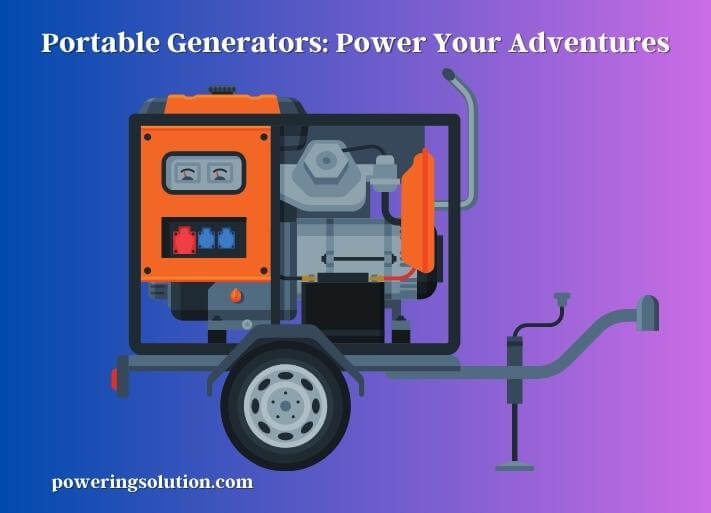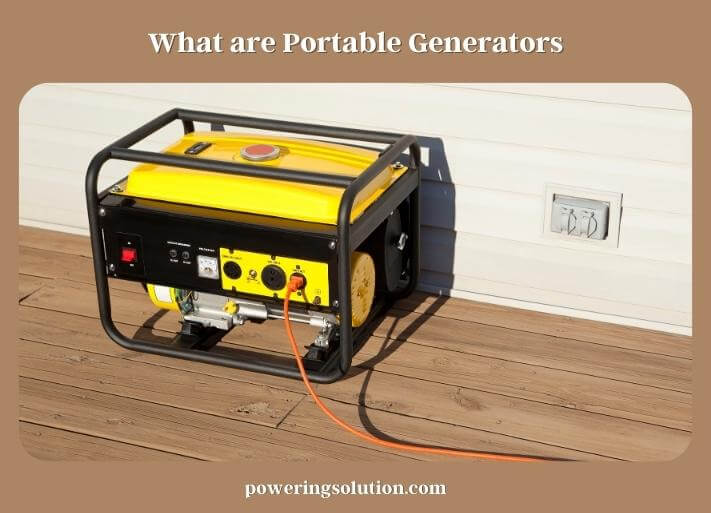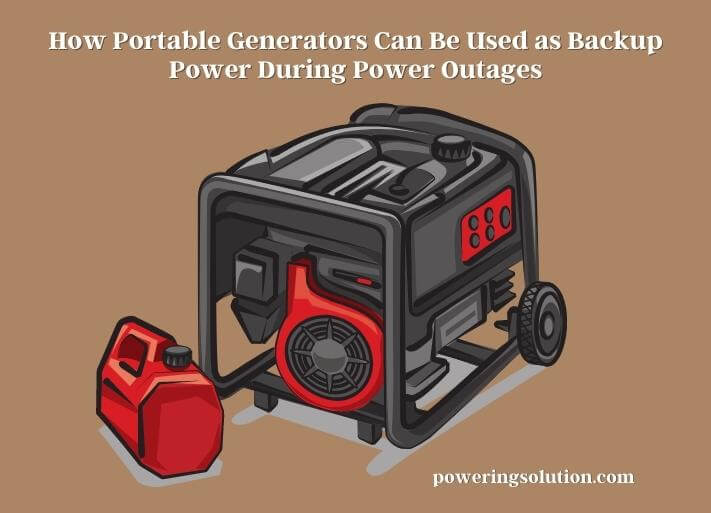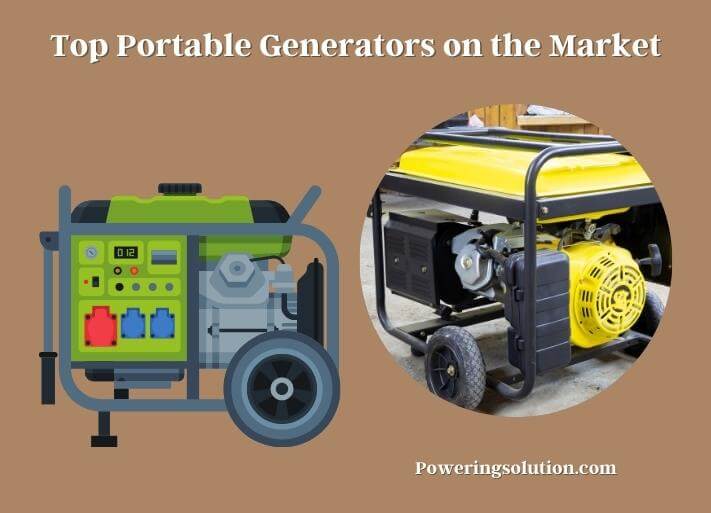Published on: March 17, 2023
Written by Ian Carter / Fact-checked by Baten Khalil
As outdoor enthusiasts, we know that a reliable source of power can be a game-changer when exploring the great outdoors. Whether you’re camping, tailgating, or RVing, having a portable generator can provide the power you need to keep your devices charged, run essential appliances, and make your adventure more enjoyable.

We’ll dive deep into the world of portable generators and explore everything you need to know to make an informed decision when choosing the right one for your needs. From the different types of portable generators available to the benefits of having one, we’ll cover it all. Plus, we’ll provide a list of the top portable generators on the market to help you make the best choice for your adventure.
What are Portable Generators?
Portable generators are a type of generator that can be easily moved from one location to another. Unlike standby generators, which are permanently installed and connected to a home or building’s electrical system, portable generators are designed to be used on the go. There are several types of portable generators, including inverter generators, conventional generators, and dual-fuel generators.
Inverter generators are the most popular type of portable generator due to their quiet operation and fuel efficiency. They are ideal for powering sensitive electronics, such as laptops and smartphones, as they provide clean and stable power.

Conventional generators, on the other hand, are more affordable but can be noisier and less fuel-efficient. Dual-fuel generators can run on both gasoline and propane, providing flexibility in fuel choice.
Explain the Advantages of Having a Portable Generator for Outdoor Activities
When it comes to outdoor activities, having a portable generator can provide several advantages. Here are just a few:
- Power your devices: With a portable generator, you can keep your devices charged and connected to the outside world. Whether you need to charge your phone, power a laptop, or run a GPS device, a portable generator can provide the necessary power.
- Run essential appliances: If you’re camping in an RV or setting up a tailgate party, a portable generator can power essential appliances such as a refrigerator, air conditioner, or heater. This means you can enjoy the comfort of home even while in the great outdoors.
- Emergency power source: In the event of a power outage, a portable generator can provide a backup power source to keep your home essentials running. You can also take it with you on the go in case of emergency situations.
- More freedom: With a portable generator, you’re not tied to a power outlet, which means you can set up camp anywhere you like without worrying about finding an electrical hookup. This gives you the freedom to explore and enjoy the outdoors on your terms.
How Portable Generators Can Be Used as Backup Power During Power Outages
Portable generators can be an excellent backup power source during power outages. In the event of a power outage, a portable generator can provide the necessary power to keep your home essentials running, such as your refrigerator, lights, and communication devices.
Select a portable generator that can provide enough power to run your essential appliances. Consider the wattage requirements of the appliances you want to power and choose a generator that can handle that load.

Once you’ve selected the generator, set it up in a well-ventilated outdoor area, away from doors and windows, to avoid the risk of carbon monoxide poisoning. Follow the manufacturer’s instructions for setup and operation.
Use extension cords to connect your appliances to the generator. Make sure to use outdoor-rated extension cords and plug each appliance directly into the generator or into a heavy-duty surge protector.
Once everything is connected, turn on the generator and let it run for a few minutes to warm up. Then, start plugging in your appliances one by one, starting with the most critical ones.
Keep an eye on the generator while it’s running, and be sure to refuel it as needed. Turn off the generator and disconnect the appliances before refueling to avoid the risk of fire or electrocution.
How to Choose the Right Portable Generator for Your Needs?
Choosing the right portable generator for your needs can be a daunting task, but with a little research and consideration, you can find the perfect one for your requirements.
| Wattage requirements | Start by determining how much power you’ll need. Make a list of the appliances you want to power and their wattage requirements. Look for a generator that can handle that load with some extra capacity to spare. |
| Fuel type | Portable generators can run on different types of fuel, including gasoline, propane, and diesel. Consider which fuel type is most convenient for you based on availability, storage, and cost. |
| Noise level | Portable generators can be noisy, so consider the noise level when choosing one. Look for generators with noise-reducing features, such as sound-dampening materials or enclosed frames. |
| Portability | If you plan to move your generator frequently, consider the weight and size of the unit. Look for models with wheels and handles for easy transportation. |
| Runtime | Consider how long you’ll need the generator to run between refueling. Look for models with longer runtimes or the ability to run on multiple fuel sources to extend the runtime. |
| Brand reputation and warranty | Look for a reputable brand with a good track record of quality and reliability. Choose a generator with a good warranty to protect your investment. |
Maintenance and Safety Tips for Portable Generators
Proper maintenance and safe operation of portable generators are crucial to prevent accidents and ensure the longevity of the unit. Some tips are below for maintaining and operating your portable generator safely:
- Read the manual: Before using your portable generator, read the manufacturer’s manual carefully and follow all instructions for safe operation and maintenance.
- Keep the generator dry: Portable generators should always be kept in a dry, well-ventilated area. Avoid operating the generator in wet conditions or near water.
- Regular maintenance: Regularly inspect the generator for any signs of wear or damage, such as frayed wires or loose connections. Change the oil and air filter according to the manufacturer’s recommendations.
- Fuel safety: Store fuel for the generator in a well-ventilated area away from living spaces and heat sources. Turn off the generator and let it cool before refueling. Never store fuel inside the generator.
- Carbon monoxide safety: Portable generators emit carbon monoxide, which is a colorless and odorless gas that can be lethal. Always operate the generator in a well-ventilated area, away from doors and windows. Install battery-operated carbon monoxide alarms in your home and test them regularly.
- Extension cords: Use only heavy-duty, outdoor-rated extension cords to connect appliances to the generator. Make sure the cords are in good condition and not frayed.
- Grounding: Properly ground the generator to prevent electric shock. Follow the manufacturer’s instructions for grounding.
Top Portable Generators on the Market
There are many portable generators on the market, each with its own set of features and benefits.

Honda EU2200i: This generator is known for its quiet operation, fuel efficiency, and reliable performance. It has a maximum output of 2,200 watts and can run up to 8.1 hours on a single tank of gas.
WEN 56200i: The WEN 56200i is a compact and lightweight generator with a maximum output of 2,000 watts. It is designed for quiet operation and features an eco-mode to save fuel and extend runtime.
Champion 3800-Watt Dual Fuel: This generator can run on either gasoline or propane and has a maximum output of 3,800 watts. It features an electric start and a digital display for easy monitoring of runtime and fuel level.
Westinghouse iGen4500: The Westinghouse iGen4500 is a powerful generator with a maximum output of 4,500 watts. It features a remote start, an LED display, and a fuel efficiency mode for extended runtime.
Briggs & Stratton 30651 P2200: The Briggs & Stratton P2200 is a compact and lightweight generator with a maximum output of 2,200 watts. It features a quiet operation and an eco-mode to save fuel and extend runtime.
Look for a reputable brand with a good track record of quality and reliability, and always follow the manufacturer’s instructions for safe operation and maintenance.
Last Point
Portable generators are a convenient and reliable source of power for a variety of needs, from outdoor activities to backup power during outages. When shopping for a portable generator, consider factors such as your power needs, fuel type, noise level, and portability. Look for a reputable brand with a good track record of quality and reliability, and be sure to read the manufacturer’s manual and follow all instructions for safe operation and maintenance.
Whether you’re camping in the great outdoors or preparing for a power outage at home, a portable generator can provide the peace of mind and convenience you need to keep your life running smoothly.
FAQs
How Can I Safely Store My Portable Generator?
To safely store your portable generator, first, ensure that it is cool and has been turned off. Drain any remaining fuel and store it in a well-ventilated area away from any heat sources or flames. Cover the generator with a protective cover and store it in a dry, cool location.
How Often Should I Perform Maintenance on My Portable Generator?
The frequency of maintenance will vary depending on the generator and its usage, but generally, it is recommended to perform basic maintenance such as changing the oil and air filter every 50-100 hours of use. Be sure to consult the manufacturer’s manual for specific guidelines and recommendations.
Can I Run My Portable Generator Indoors?
No, it is not safe to run a portable generator indoors or in an enclosed space due to the risk of carbon monoxide poisoning. Always use your generator outdoors in a well-ventilated area and keep it at least 20 feet away from windows, doors, and vents.
How Do I Choose the Right Size Generator for My Needs?
To choose the right size generator, consider the total wattage of the appliances and devices you plan to power at the same time. Add up the wattage of each device and select a generator with a total output that is slightly higher than your needs to ensure reliable operation.

